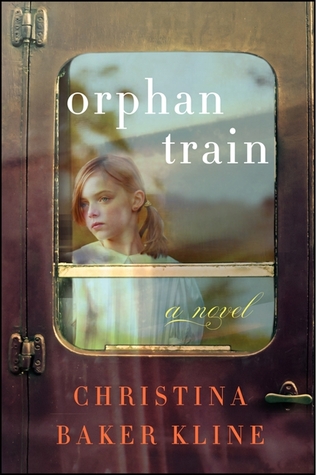This week's read for my 52 books in 52 weeks project is Orphan Train, a gem from Christina Baker Kline that has hit the bestseller lists in its trade paperback release.

Orphan Train contains two interwoven story lines. The first is the unlikely friendship between a 91-year-old woman named Vivian and a 17-year-old goth-girl named Molly. While they are brought together because foster child Molly has to do some community service work for the crime of stealing her favorite book from the library, it's their joint history as orphans that forges their bond.
The second story is where the title comes in: the story of an Irish orphan, who starts out her life with one name (Niahm, pronouced Neev) and ends it with another (I'll let you find that out), who is placed on an Orphan Train in the late 1920s when her parents can no longer care for her. This is where the historical fiction aspect of the novel comes in: as these Orphan Trains were real. From the 1860s till 1929, trains carried over 200,000 children from the east coast to adoptive families in the west, a roving almost-auction of children who needed families. A bizarre piece of history that Kline stumbled across and has brought to life.
What a lovely book. Kline does an impressive job of capturing the voice of not one, but two, very different children. I was immediately drawn into modern-day Molly's story, a child who's been shuffled from foster home to foster home and who has cloaked herself in an aggressive personality to protect herself from hurt, from caring too much.
I was more drawn in by Niamh's story as the book progressed. As Kline builds the world in which she lives, I felt more and more taken with this child who had to grow up too fast, too soon, but who ultimately finds a way to make the best of her circumstances.
The book also has some excellent writing in it. This paragraph in particular, from an early chapter, is lodged in my mind:
I was so afraid that our lives would fall apart again that I tried to ignore the things that frightened me most: our da's continued love affair with drink, which a change in country did not change; Mam's black moods and rages; the incessant fighting between them. I wanted everything to be all right. I held Maisie to my chest and whispered in her ear -- there's none of them can sing so sweet, my singing bird, as you -- trying to silence her. When she finally stopped, I was only relieve, not understanding that Maisie was like a canary in a mine, warning us of danger, but it was too late.
And finally, I have a special place in my heart for the way that a favorite book of mine -- Anne of Green Gables -- was woven into the story (Niamh has bright red hair, freckles, eyes like Anne's, and is forced from home to home like Anne was before finding Mathew and Marilla). Whether Kline was consciously or unconsciously trying to imagine what Anne's life must have been like before she found a good home, she achieved it.
And so to next week. A Nora Robert's book, Whiskey Beach, is sitting atop The New York Times bestseller list, so I'll give that a try. Once again, I've never read anything by her. I really do live under a literary rock!
